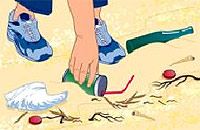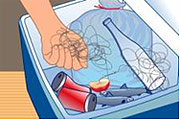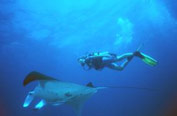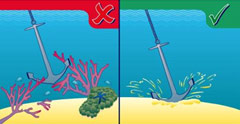|
| |
|
Thursday: SustainableTourism
We Australians are privileged to have one of the greatest natural areas on earth under our care. The Great Barrier Reef is the greatest collection of coral reefs on earth. People come from all over Australia and all parts of the world to marvel at the beauty of its waters, islands, corals, fish and birds.
Some of us are even more privileged as the Great Barrier Reef is our home, our neighbouring environment or our place of work or recreation. With these privileges comes the deep responsibility to protect the Reef, its waters, islands and living things from harm, and to pass on this rich heritage to our children and future generations in its full health and beauty.
|
|
Major Sponsor
| Our Principal Naming Rights Sponsor for Seaweek 06 is BAG SMART. Bag Smart is a social marketing campaign to reduce plastic shopping bags in the community. |
 |
|
|
20+ ways to reduce the impact of tourism
To help minimise the impact we as humans can have on our marine environments below are some simple things that you can do to help lighten your footprint yet enjoy and learn about these fragile places.
Download these as a pdf.
When visiting islands:
1. Always use designated campsites. 2. Do not touch or disturb nesting seabirds or turtles. 3. Dispose of all rubbish correctly. Do not throw rubbish (such as food scraps, plastic, paper, fishing gear, and cigarette butts) overboard – take it back to shore for proper disposal. |

|
When on the water:
4. Take all rubbish home with you including fishing line.
5. Stay alert for marine animals and slow down in areas where they have been sighted.
6. Use care when approaching shorelines, beaches and reef edges.
7. Maintain your boats motor. Oil spills even on a small scale are deadly to most marine life. |
Activity: Question Grid

|
When out fishing:
8. Take only what fish you need and abide by possession and size limits.
9. Return all undersized fish or fish you don’t wish to keep to the water as carefully and quickly as possible.
10. Study zoning maps for the areas you are visiting to ensure you are aware of any restrictions associated with fishing activity.
11. Secure all loose articles, clothing and towels on the deck, to prevent them blowing off or accidentally falling overboard. |
Activity: Fish Game

|
When diving or snorkelling:
12. Observe animals. Don’t touch, handle, poke, prod or chase them.
13. Avoid touching or standing on coral.
14. Secure dragging diving equipment such as secondary regulators and gauges.
15. Avoid touching anything with your fins and try not to stir up sediment.
16. Collect all litter from the water and the Reef whenever you see it. |
Activity: Who looks after the Great Barrier Reef?

|
When anchoring:
17. Use public mooring where available.
18. Use the correct anchor for your situation and environment.
19. Anchor in sand or mud whenever possible, never anchor directly on coral.
|
Activity: Sign-making

|
As responsible and aware caretakers:
20. As as visitor on a tour to any area, make an effort, ask the tour operator for a bag and pick up some of the marine debris you are sure to encounter .
21. Prepare yourself, read and research the area you are visiting and learn to enjoy the place you are visiting with respect and participate in all the responsible practises they have in place.
22. Consider other issues and build this list to a 40 point plan.
|
Activity: Reflection
Activity: Mind map; Collage; Activities on the Reef
Activity: Imagining the future; Continuum |
|
|
|
|
|



